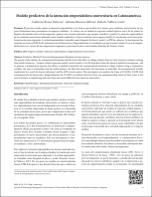JavaScript is disabled for your browser. Some features of this site may not work without it.
Mostrar el registro sencillo del ítem
Modelo predictivo de la intención emprendedora universitaria en Latinoamérica
| dc.rights.license | Licencia Creative Commons Atribución – No Comercial – Sin Derivadas (CC BY-NC-ND 4.0) | es |
| dc.contributor.author | Krauss Delorme, Catherine Armande | |
| dc.contributor.author | Bonomo Odizzio, Adriana Raquel | |
| dc.contributor.author | Volfovicz León, Roberto Rafael | |
| dc.date.accessioned | 2021-05-19T21:40:08Z | |
| dc.date.available | 2021-05-19T21:40:08Z | |
| dc.date.issued | 2018 | |
| dc.identifier.uri | https://hdl.handle.net/10895/1466 | |
| dc.description.abstract | El presente estudio explora la intención emprendedora y los factores que inciden en la misma, para estudiantes universitarios de seis países latinoamericanos provenientes de empresas familiares. Se trabaja con un modelo de regresión ordinal logística con el fin de probar las hipótesis del modelo teórico de investigación y generar una ecuación matemática que permita cuantificar y predecir la intención emprendedora de un estudiante universitario utilizando como variables explicativas: el tipo de relación con la empresa familiar, la vinculación con la innovación, la motivación para emprender, la actitud emprendedora (entendida como búsqueda de placer y poder) y el PBI de cada país. La investigación fue realizada en el marco RLIE (Red Latinoamericana de Innovación y Emprendimiento) en estudiantes que por lo menos tenían un curso de emprendedurismo en su carrera del área empresarial o ingeniería y provenían de nueve universidades diferentes de América Latina. | es |
| dc.description.abstract | Predictive Model of University Entrepreneurial Intention in Latin America. The present study explores the entrepreneurial intention and the factors that affect in college students from six Latin American countries coming from family businesses. A logistic ordinal regression model is used in order to test the hypothesis from the theorical model of investigation, and to generate a mathematical equation that allows to quantify and predict the entrepreneurial intention in college students using as explanatory variables: the type of relationship with the family business, the link with innovation, the motivation to undertake, the entrepreneurial attitude (understood as a search for leisure and power) and the GDP of each country The investigation was made in the frame of CLADEA´S RLIE (Red Latinoamericana de Innovación y Emprendimiento de CLADEA) in students that had at least one entrepreneurship course in their career in the area of business or engineering and came from one of nine different Latin American universities. | en |
| dc.format.mimetype | application/pdf | en |
| dc.language.iso | es | es |
| dc.publisher | Universidad Alberto Hurtado | es |
| dc.relation.ispartof | Journal of Technology Management & Innovation. Universidad Alberto Hurtado, Facultad de Economía y Negocios. Vol. 15, issue 2, 2018. | es |
| dc.subject | Emprendedores | es |
| dc.subject | Educación | es |
| dc.subject | Emprendedurismo | es |
| dc.title | Modelo predictivo de la intención emprendedora universitaria en Latinoamérica | es |
| dc.type | Artículo | es |
Ficheros en el ítem
Este ítem aparece en la(s) siguiente(s) colección(ones)
-
Artículos [51]


